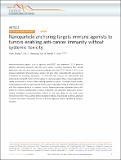| dc.contributor.author | Zhang, Yuan | |
| dc.contributor.author | Li, Na | |
| dc.contributor.author | Suh, Heikyung | |
| dc.contributor.author | Irvine, Darrell J | |
| dc.date.accessioned | 2018-05-02T18:13:15Z | |
| dc.date.available | 2018-05-02T18:13:15Z | |
| dc.date.issued | 2018-01 | |
| dc.date.submitted | 2017-04 | |
| dc.identifier.issn | 2041-1723 | |
| dc.identifier.uri | http://hdl.handle.net/1721.1/115183 | |
| dc.description.abstract | Immunostimulatory agents such as agonistic anti-CD137 and interleukin (IL)-2 generate effective anti-tumor immunity but also elicit serious toxicities, hampering their clinical application. Here we show that combination therapy with anti-CD137 and an IL-2-Fc fusion achieves significant initial anti-tumor activity, but also lethal immunotoxicity deriving from stimulation of circulating leukocytes. To overcome this toxicity, we demonstrate that anchoring IL-2 and anti-CD137 on the surface of liposomes allows these immune agonists to rapidly accumulate in tumors while lowering systemic exposure. In multiple tumor models, immunoliposome delivery achieves anti-tumor activity equivalent to free IL-2/anti-CD137 but with the complete absence of systemic toxicity. Immunoliposomes stimulated tumor infiltration by cytotoxic lymphocytes, cytokine production, and granzyme expression, demonstrating equivalent immunostimulatory effects to the free drugs in the local tumor microenvironment. Thus, surface-anchored particle delivery may provide a general approach to exploit the potent stimulatory activity of immune agonists without debilitating systemic toxicities. | en_US |
| dc.publisher | Nature Publishing Group | en_US |
| dc.relation.isversionof | http://dx.doi.org/10.1038/S41467-017-02251-3 | en_US |
| dc.rights | Attribution 4.0 International (CC BY 4.0) | en_US |
| dc.rights.uri | https://creativecommons.org/licenses/by/4.0/ | en_US |
| dc.source | Nature Communications | en_US |
| dc.title | Nanoparticle anchoring targets immune agonists to tumors enabling anti-cancer immunity without systemic toxicity | en_US |
| dc.type | Article | en_US |
| dc.identifier.citation | Zhang, Yuan et al. “Nanoparticle Anchoring Targets Immune Agonists to Tumors Enabling Anti-Cancer Immunity Without Systemic Toxicity.” Nature Communications 9, 1 (January 2018) © 2018 The Author(s) | en_US |
| dc.contributor.department | Massachusetts Institute of Technology. Department of Biological Engineering | en_US |
| dc.contributor.department | Massachusetts Institute of Technology. Department of Materials Science and Engineering | en_US |
| dc.contributor.department | Koch Institute for Integrative Cancer Research at MIT | en_US |
| dc.contributor.mitauthor | Zhang, Yuan | |
| dc.contributor.mitauthor | Li, Na | |
| dc.contributor.mitauthor | Suh, Heikyung | |
| dc.contributor.mitauthor | Irvine, Darrell J | |
| dc.relation.journal | Nature Communications | en_US |
| dc.eprint.version | Final published version | en_US |
| dc.type.uri | http://purl.org/eprint/type/JournalArticle | en_US |
| eprint.status | http://purl.org/eprint/status/PeerReviewed | en_US |
| dc.date.updated | 2018-04-27T14:41:26Z | |
| dspace.orderedauthors | Zhang, Yuan; Li, Na; Suh, Heikyung; Irvine, Darrell J. | en_US |
| dspace.embargo.terms | N | en_US |
| dc.identifier.orcid | https://orcid.org/0000-0002-2931-7592 | |
| dc.identifier.orcid | https://orcid.org/0000-0003-0787-298X | |
| mit.license | PUBLISHER_CC | en_US |
